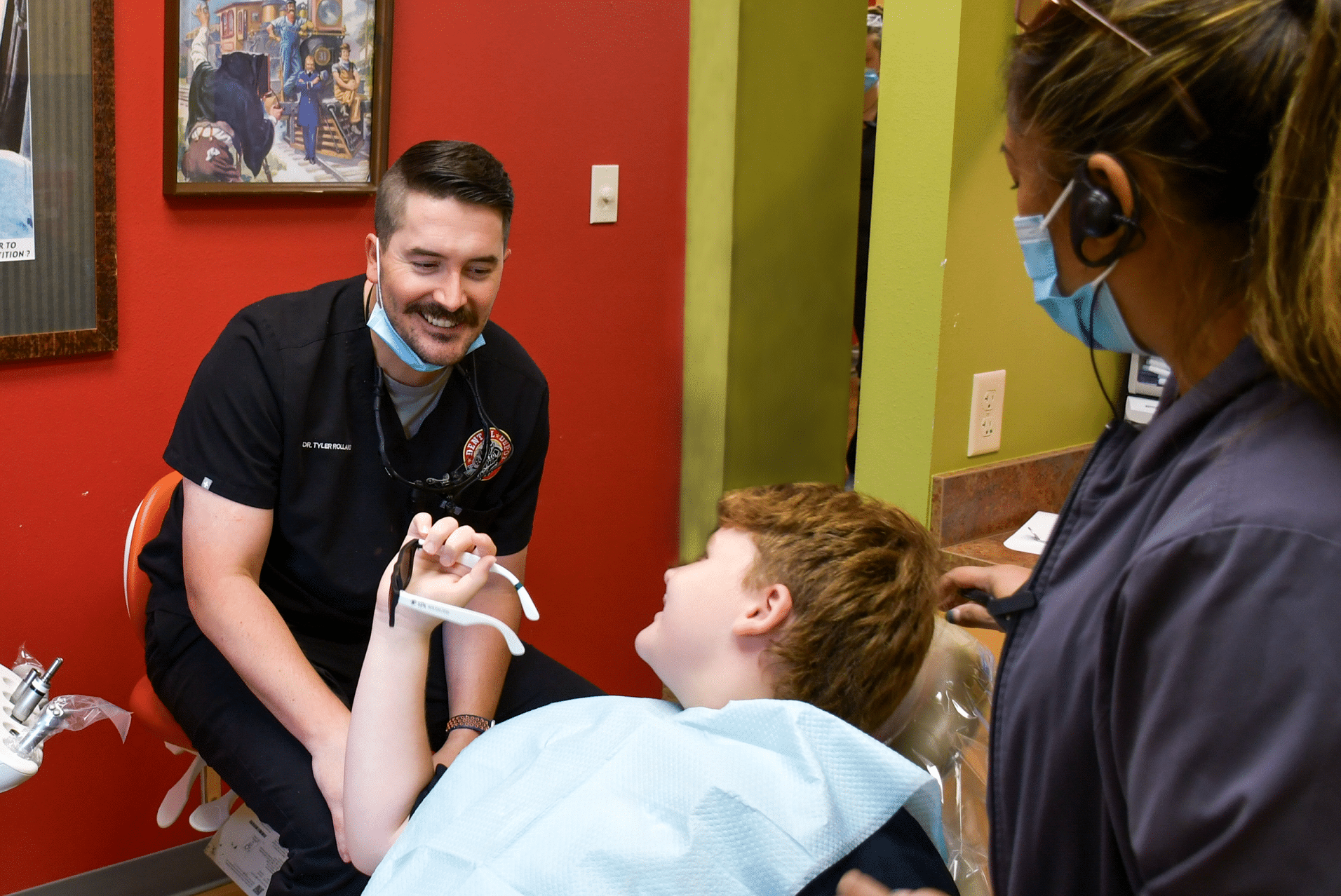Pediatric dentistry plays a vital role in ensuring children’s dental health and fostering healthy habits that last a lifetime. While baby teeth may be temporary, they are highly susceptible to decay and play a critical role in a child’s overall development. To give your child the best start, it’s recommended they visit a dentist by their first birthday, setting the foundation for a lifetime of healthy smiles.
At Dental Depot of Oklahoma we understand that our littlest patients sometimes need a little extra care to feel at ease. That’s why we create a welcoming environment with kid-friendly waiting areas, gentle and friendly staff. By making dental visits a positive and enjoyable experience, we help children build confidence in their oral health journey, setting the stage for a lifetime of strong, healthy smiles.

Healthy baby (or primary) teeth are crucial for a child’s development. They not only hold the space needed for permanent teeth but also contribute to proper chewing, biting, speech development, and overall appearance. However, because of porous, developing enamel, a diet that’s typically high in sugar, and a lack of dexterity and maturity for proper brushing habits, your child’s baby teeth are especially vulnerable to cavities, decay, and erosion, which can cause problems for the adult teeth behind them. That’s why maintaining a healthy diet and practicing good daily oral hygiene are essential for keeping baby teeth strong and healthy.
Cavities in baby teeth can serve as an early warning sign for future dental health. If a child shows a tendency toward decay, dentists may recommend preventive measures like fluoride treatments or dental sealants. Treating cavities in baby teeth is crucial, as untreated decay can spread to the developing adult teeth beneath the gums. Severe cases may even require the removal of a baby tooth, which can impact the alignment of adult teeth, as well as the development of the child’s mouth and speech.
The American Dental Association recommends that children visit the dentist within the first six months of getting their first tooth or shortly after their first birthday. This initial appointment is primarily a checkup and consultation, during which the dentist will complete standard first-time patient procedures. Unless any concerns or issues arise, this visit allows the dentist to get to know your child and help them feel comfortable in the office environment.
It also marks the beginning of your child’s routine bi-annual dental visits. During these regular checkups, the dentist will monitor for cavities, tooth decay, and other concerns, while also offering valuable feedback on your child’s dental growth and development.
During these visits, or at their annual pediatrician checkup, infants and toddlers may also receive fluoride treatments to protect their teeth from decay.
As molars begin to erupt in older children–teeth that are often hard to reach during brushing and may have deep pits or grooves perfect for bacteria and decay–this is also a good time for dental sealants, which can help protect the chewing surfaces of the teeth and prevent cavities.
At Dental Depot, we believe it takes teamwork to keep your child’s teeth healthy through every stage of life, so we provide parents and guardians with all the resources, support, and judgment-free guidance you need to help them establish good dental hygiene habits.
We also believe in making quality dental care affordable so Dental Depot has you covered with options to help you pay for the care you and your family need, including CareCredit and SoonerCare for Medicaid patients.
Find the location nearest you and schedule your child’s first appointment today.
Your child’s first set of teeth, known as primary or baby teeth, typically begin to appear between six months and one year of age. The process usually starts with the lower front teeth (central incisors) and continues until around age three, by which time most kids will have all 20 of their baby teeth.
The usual order of eruption is as follows:
Generally, kids start losing their baby teeth around age six, beginning with the lower central incisors. This process continues until around age 12, when most children have their full set of permanent teeth.
The timing of tooth eruption and loss can vary from child to child, but it most often follows this pattern
Wisdom teeth, also known as third molars, are the last set of teeth to develop, typically emerging between the ages of 17 and 21. For some people, wisdom teeth may never develop, while others may only grow a partial set. When they do come in, they often face challenges due to the lack of space in the mouth. As a result, wisdom teeth frequently erupt crookedly, partially, or remain fully impacted beneath the gums. This improper eruption can lead to issues like pain, infection, and damage to neighboring teeth, gums, or bone.
Because of these potential complications, approximately 85% of people who develop wisdom teeth will need to have them removed, according to the American Association of Oral and Maxillofacial Surgeons. However, in rare cases where wisdom teeth erupt fully, align properly, and do not cause pain or health concerns, extraction may not be necessary. At Dental Depot of Oklahoma, our dental professionals can assess the condition of your child’s wisdom teeth and determine whether removal is the best course of action to protect his or her oral health.
Caring for baby teeth is crucial, even though they’re temporary. Baby teeth play an important role in your child’s overall oral health and development, and neglecting them can lead to cavities, infections, and even damage to the underlying adult teeth. Start by brushing your child’s teeth as soon as the first tooth erupts. Use a tiny smear of fluoride toothpaste—about the size of a grain of rice—on a small, soft-bristled toothbrush and gently clean their teeth and gums. Scheduling an initial visit to the pediatric dentist early on can also help. Even if there aren’t enough teeth for a full cleaning, this visit allows your child to become familiar with the dental environment and helps build a positive relationship with oral care. Early exposure can ease any fear or anxiety about dental visits in the future.
Beyond brushing, there are additional steps parents can take to protect their child’s baby teeth. Avoid putting your baby to bed with a bottle, and limit the use of bottles and sippy cups, especially when filled with sugary drinks. Water is always the best choice for long car rides or between meals. Minimize sugary and sticky foods in your child’s diet, and offer juice only during meals, if at all. For extra protection, consider fluoride treatments to strengthen enamel and dental sealants to protect hard-to-reach teeth like molars. These simple, painless procedures can significantly reduce the risk of cavities and help avoid more extensive dental treatments later on, ensuring your child’s smile stays healthy as they grow.
